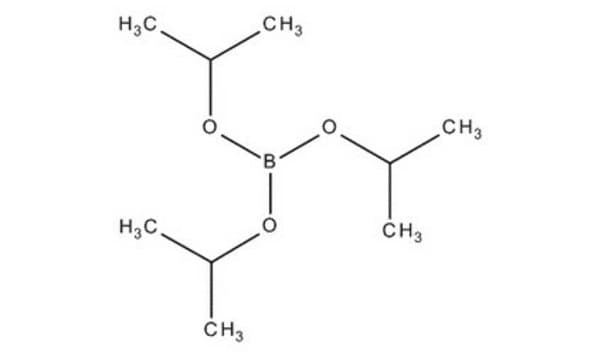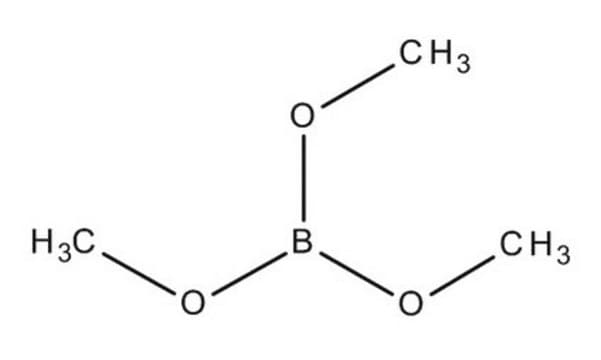197335
Triisopropyl borate
≥98%
Synonym(s):
Boric acid triisopropyl ester, Boron isopropoxide, Triisopropoxyborane
Sign Into View Organizational & Contract Pricing
All Photos(1)
About This Item
Linear Formula:
[(CH3)2CHO]3B
CAS Number:
Molecular Weight:
188.07
Beilstein:
1701469
EC Number:
MDL number:
UNSPSC Code:
12352103
PubChem Substance ID:
NACRES:
NA.22
Recommended Products
vapor pressure
76 mmHg ( 75 °C)
Quality Level
Assay
≥98%
form
liquid
impurities
1% isopropanol
refractive index
n20/D 1.376 (lit.)
bp
139-141 °C (lit.)
density
0.815 g/mL at 25 °C (lit.)
SMILES string
CC(C)OB(OC(C)C)OC(C)C
InChI
1S/C9H21BO3/c1-7(2)11-10(12-8(3)4)13-9(5)6/h7-9H,1-6H3
InChI key
NHDIQVFFNDKAQU-UHFFFAOYSA-N
Looking for similar products? Visit Product Comparison Guide
General description
Trialkyl borate with good thermal properties.
Application
Reagent used to ortho-borylate 1-substituted naphthalenes for Pd-catalyzed coupling with aryl halides.
Flash Point(F)
62.6 °F - closed cup
Flash Point(C)
17 °C - closed cup
Personal Protective Equipment
dust mask type N95 (US), Eyeshields, Gloves
Choose from one of the most recent versions:
Already Own This Product?
Find documentation for the products that you have recently purchased in the Document Library.
Customers Also Viewed
Tetrahedron, 60, 4887-4893 (2004)
Synthesis, 3478-3478 (2006)
Yersica Rios Yepes et al.
Dalton transactions (Cambridge, England : 2003), 49(4), 1124-1134 (2020-01-03)
A set of alkyl aluminum complexes supported by non-symmetric ferrocenyl amidine ligands were used as catalysts for the preparation of cyclic carbonates from epoxides and carbon dioxide using Bu4NI as a co-catalyst. A modified method for the synthesis of aminoferrocene
Flexible interlocked porous frameworks allow quantitative photoisomerization in a crystalline solid.
Yongtai Zheng et al.
Nature communications, 8(1), 100-100 (2017-07-26)
Photochromic molecules have shown much promise as molecular components of stimuli-responsive materials, but despite recent achievements in various photoresponsive materials, quantitative conversion in photochemical reactions in solids is hampered by the lack of intrinsic structural flexibility available to release stress
Our team of scientists has experience in all areas of research including Life Science, Material Science, Chemical Synthesis, Chromatography, Analytical and many others.
Contact Technical Service











